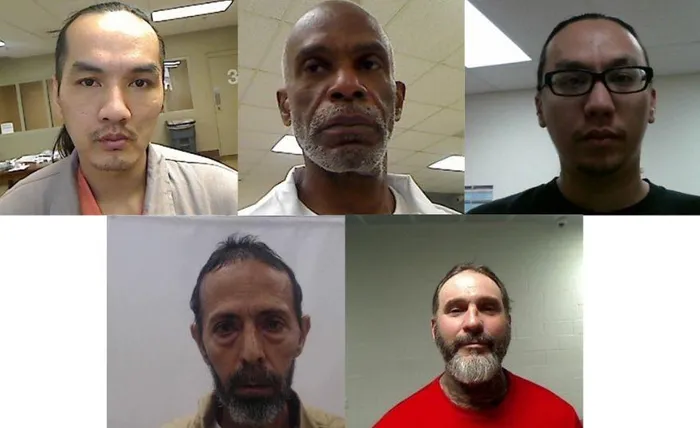Trump using Africa as ‘dumping ground’ for convicts
'THIRD COUNTRY' SCHEME

A controversial Trump-era US deal to deport five convicted criminals to eSwatini has sparked outrage in the kingdom and fears that, once released, the offenders may cross into South Africa.
Image: X
Donald Trump and his US administration are facing significant criticism over what has been called a ‘third country’ scheme to send criminals to Africa.
Activists, analysts, and human rights organisations are concerned about the security dangers that the deportation of hardened convicts could pose to Swaziland itself and the Southern Region. The mountainous Southern African kingdom borders South Africa and Mozambique.
Without sharing their names, Washington, through its Department of Homeland Security assistant secretary, Tricia McLaughlin, last month confirmed the five convicted nationals were from Vietnam, Jamaica, Laos, Cuba and Yemen.
Kelly Stone, Senior Consultant, Justice and Violence Prevention at the Institute for Security Studies, highlighted that these actions appear to be focused on identifying more authoritarian leadership styles and exploiting the desperation or instability of certain countries.
She suggested that the primary security challenge lies in the potential destabilisation of Eswatini's national stability and its relationship with South Africa, rather than the immediate threat posed by the five individuals.
Although Stone stated there is likely no legal recourse for South Africa as a third party regarding the deal between Eswatini and the US, she emphasised South Africa's obligation to closely monitor the security implications given its bordering relationship with Eswatini.
She suggested that Trump's transactional approach to governance might be setting up African countries to compete for US favour, potentially disrupting regional relations through varied import tariff rates.
What does Eswatini gain from accepting these criminals, noting the undisclosed nature of the deal?
Stone confirmed that the terms are secret and assumed that, similar to El Salvador, the benefits could be financial and political, such as White House visits or endorsements for ruling parties.
She stated that it is not a capacity issue, as the US has sufficient resources to incarcerate these individuals, but rather a fulfilment of a campaign promise by the Trump administration to expel violent foreign criminals.
Stone suggested that Trump's actions are driven by a campaign promise to "make America great again" by removing foreign nationals convicted of crimes, as they believe that porous borders have led to such individuals being in the US, adding that Trump is not interested in international humanitarian law or US obligations under it.
''What we're seeing is that he's particularly targeting countries that have more authoritarian leadership. Rwanda has held up its hand and said it's willing to take 250 deportees. We know that the human rights abuses and repression in Rwanda are very well documented. He's not going to places like South Africa, Botswana, Kenya, that are much more robust in their human rights architecture.''
Wandile Dludlu, a pro-democracy activist and deputy president of Eswatini's largest opposition movement, the People's United Democratic Movement (PUDEMO), recently stated to Al Jazeera: “The US government views us as a criminal dumpsite and undermines the Emaswati [the people of Eswatini].”
Dludu criticised the release of convicted criminals as "distasteful and fraudulent behaviour by His Majesty and his government amid the unprecedented public healthcare crisis" in the country.
PUDEMO is a banned organisation in Eswatini.
On its X account, the government of Eswatini maintained: "As a responsible member of the global community, the Kingdom of Eswatini adheres to international agreements and diplomatic protocols regarding the repatriation of individuals, ensuring that due process and respect for human rights is (sic) followed."
Political analyst, Anda Mbikwana, also weighed in on the matter, saying it represents a troubling law in immigration policy that exposes both strategic shortsightedness and moral contradictions.
''This 'third-country' deportation" programme sends individuals from various countries to cash-strapped African nations, essentially paying them to warehouse criminals that America claims it cannot manage despite its vast resources and extensive prison system. The arrangement smacks of neocolonial exploitation, with wealthy America exporting its problems to impoverished Africa.
''The irony is particularly stark given America's simultaneous efforts to attract Africa's brightest minds. While actively recruiting the continent's doctors, engineers, and entrepreneurs — contributing to devastating brain drain — America now dumps its most problematic residents on African soil. This treats Africa as both a talent mine and a human waste repository.
''Beyond geopolitical implications lie serious human rights concerns. Reports indicate these individuals face solitary confinement for undetermined periods, conditions that international organisations classify as torture when prolonged. If America believes in rehabilitation and human dignity, shipping problems abroad while importing talent represents the ultimate rejection of these principles.''
Mbikwana added that this deportation policy creates dangerous precedents. ''The approach externalises costs while abandoning responsibility, undermining America's moral authority to criticise other nations' treatment of migrants. This is not confident superpower behaviour but a nation unwilling to face its challenges,'' he concluded.
Refugee deportation has been an ongoing issue.
According to Reuters, the UK had explored third-country deportation policies as part of its efforts to manage irregular migration and asylum claims. Under the previous Conservative government, the UK partnered with Rwanda in 2022, planning to relocate asylum seekers to Rwanda for processing. The UK committed £370 million ($497 million) in development funding over five years in exchange for this arrangement.
In November 2023, the UK Supreme Court declared the plan invalid, citing violations of international human rights norms due to Rwanda's inadequate asylum system and concerns regarding human rights.
Similarly, Israel had implemented a third-country deportation policy targeting African asylum seekers by sending them to countries like Rwanda and Uganda from 2013 to 2018. The Israeli government offered $3,500 per person to those who agreed to leave.
In 2018, Israel’s Supreme Court effectively dismantled this policy, ruling it unlawful.
According to IOL, spokesperson for the Department of International Relations and Cooperation, Minister Ronald Lamola, Chrispin Phiri, confirmed that concerns were formally communicated to Eswatini after reports emerged that a group of high-risk criminals of various nationalities had landed in the country.